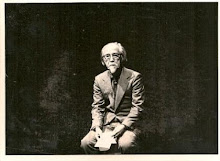 How does one begin to describe a film like Takayuki Hirao’s Gyo? With an end of the world scenario that revolves around “death stench” gas, marine life that walk on mechanical legs, and a trio of college girls on summer vacation, Gyo has everything necessary for a comedy horror film reminiscent of The Evil Dead franchise. But after a ravenous walking shark smashes into the summerhouse where Kaori (voiced by Mirai Kataoka) and her friends are staying within the first 10 minutes, making quick work not only of the décor but also exposing the cracks in the women’s friendship, all assumptions of the film being kitsch or tongue-in-cheek quickly evaporate.
How does one begin to describe a film like Takayuki Hirao’s Gyo? With an end of the world scenario that revolves around “death stench” gas, marine life that walk on mechanical legs, and a trio of college girls on summer vacation, Gyo has everything necessary for a comedy horror film reminiscent of The Evil Dead franchise. But after a ravenous walking shark smashes into the summerhouse where Kaori (voiced by Mirai Kataoka) and her friends are staying within the first 10 minutes, making quick work not only of the décor but also exposing the cracks in the women’s friendship, all assumptions of the film being kitsch or tongue-in-cheek quickly evaporate.
Combining the claustrophobic elements found in Hitchcock’s The Birds (1963) and David Cronenberg during his body horror phase, Hirao’s Gyo, which was originally a popular manga penned by Junji Ito, is a bleak horror tale. It posits a world not only where nature, so fed up from our constant exploitation of it, has decided to fight back by turning our pets, our loved ones, and our food supply against us, but also where the sins of our collective past, specifically our never ending bloodlust to murder anyone or anything we think dangerous to our existence, has come for sweet vengeance. With a brisk runtime of 70 minutes, the anime does not get bogged down in delivering a message or sermonizing for change. In Ito's world, nothing can avert the end of the world and the only hope for survivors is a quick permanent death.
As I stated earlier, although Gyo is a manga adaptation, the film is not a straight copy. For one thing, in Ito’s version, it is Tadashi, Kaori’s boyfriend, who we follow in the manga. In the film, Tadashi, voiced byTakuma Negishi, gets very little screen time and it is Kaori’s journey to be reunited with Tadashi that drives the entire plot. Beyond that, another main difference is that Ito’s characterization of Kaori is far less flattering: she is a very frail, obnoxious woman whose main role in is to be saved by her boyfriend.
By switching the focus to a female protagonist, Hirao’s version is not only far more interesting because it plays against type to audience expectations of damsels in distress but it also evokes American horror movies which have primarily female protagonists having to fight and survive until the last reel of the film, e.g. Ellen Ripley from the Alien series or Laurie Strode from the Halloween franchise. In those films, just as the female protagonists are pushed to their physical and psychological breaking points, Kaori also endures a ridiculous series of trials not matched since the time of Job. In fact, the story of Gyo is very biblical, the famous 10 plagues found in the story of Moses being condensed into one big cataclysmic event of otherworldly origins and, instead of the conflict between two very disparate religions, Egyptian versus Israelite, we find science and civilization under attack from nature. In Gyo, the angry God from the Old Testament has judged mankind as unworthy to walk the earth and has decided to clean house.
 In contrast to Kaori’s heroic arc, a parallel storyline that follows her girlfriends, who she abandons at Tadashi’s summerhouse in Okinawa, perfectly encapsulates just how barbaric human beings can be to one another when one’s survival is on the line. In fact, the friendship between the hyper-sexualized Erika (voiced by Ami Tanguchi) and chubby milquetoast Aki (Masami Saeki) is predicated mainly by their connection with Kaori. Their civility to one another quickly vanishes the moment danger in the form of walking rabid fish that begin to stampede on land.
In contrast to Kaori’s heroic arc, a parallel storyline that follows her girlfriends, who she abandons at Tadashi’s summerhouse in Okinawa, perfectly encapsulates just how barbaric human beings can be to one another when one’s survival is on the line. In fact, the friendship between the hyper-sexualized Erika (voiced by Ami Tanguchi) and chubby milquetoast Aki (Masami Saeki) is predicated mainly by their connection with Kaori. Their civility to one another quickly vanishes the moment danger in the form of walking rabid fish that begin to stampede on land.
This ever-pervasive pessimism is carried over to the final image of the film, which in itself appears to be a reference to another doomsday story, Kiyoshi Kurosawa’s Kairo (Pulse, 2001). Gyo is not just an effective horror story, but also a warning to all of the future that might await us.
(Originally published on July 30, 2012 at VCinema Show Podcast and Blog.)




No comments:
Post a Comment